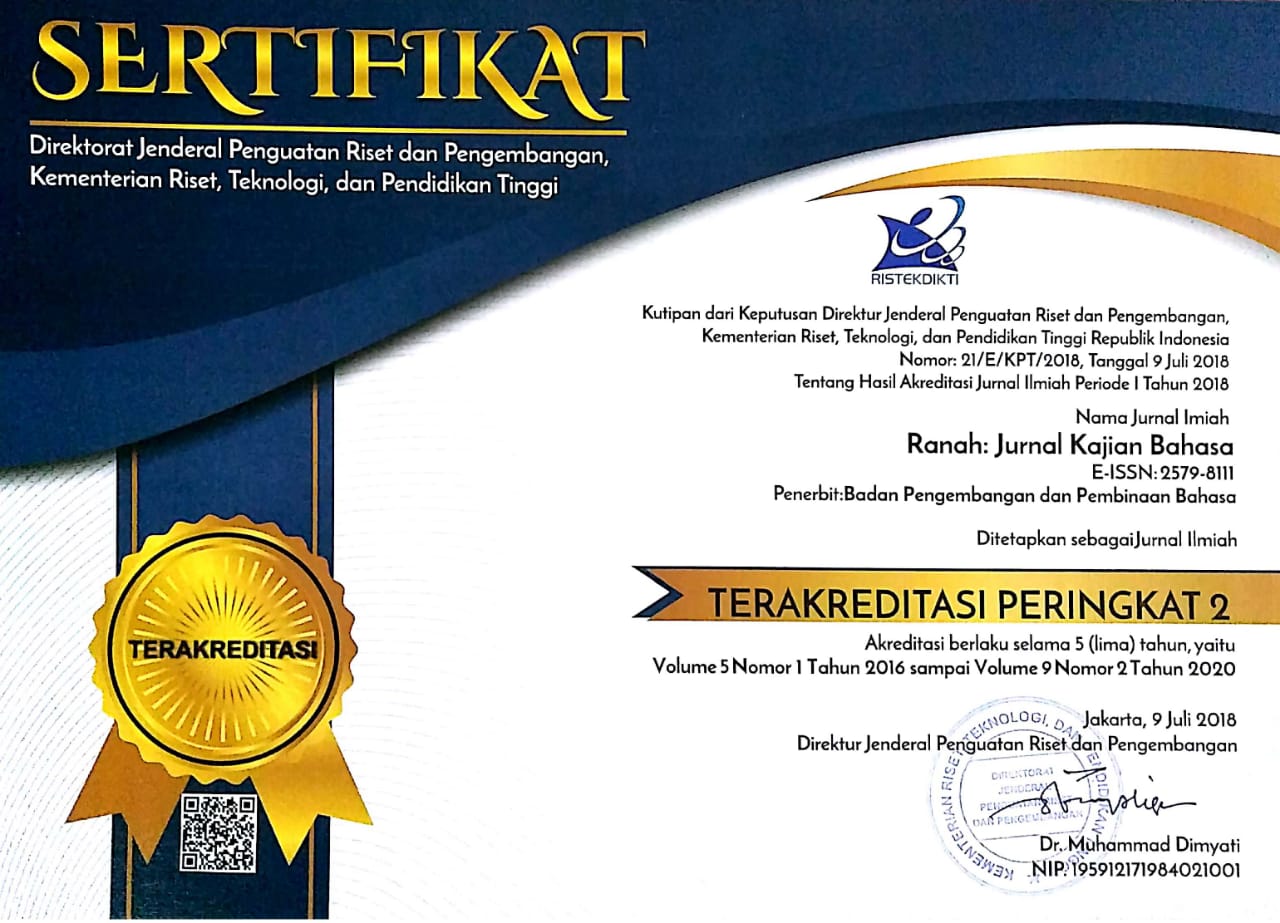Speech Acts Production in EFL Classroom Interactions (A Conversation Analysis)
Abstract
The purpose of this study was to analyze the speech act types and functions that were used by an EFL teacher and their students during classroom interactions. Observational data was collected and analyzed according to Conversation Analysis standards (CA). The findings of the study revealed that the types of speech acts produced by the teacher and students were influenced by their respective roles and statuses. Although the students produced fewer speech acts, they served the same functions as the teacher's speech acts in terms of controlling and managing classroom interactions. As a result, the speech acts of both the students and teacher distributed authority in different ways during turn-taking and commodity exchanges. The practical knowledge and pedagogical aspect of the teacher-student relationship as a unique social event in the classroom context has the potential to effectively manage classroom interactions.
Abstrak
Tujuan penelitian ini adalah untuk menganalisis jenis dan fungsi tindak tutur yang diucapkan oleh seorang guru Bahasa Inggris dan siswa dalam interaksi di kelas. Data hasil observasi dikumpulkan dan dianalisis sesuai dengan prinsip-prinsip analisis percakapan (CA). Temuan penelitian menunjukan bahwa jenis tindak tutur yang dihasilkan oleh guru dan siswa dipengaruhi oleh peran dan status masing-masing. Meskipun siswa menghasilkan lebih sedikit tindak tutur, mereka memiliki fungsi yang sama dengan tindak tutur guru dalam hal mengontrol dan mengelola interaksi di kelas. Dengan demikian, tindak tutur siswa dan guru mendistribusikan otoritas dengan cara yang berbeda selama pertukaran ide dan proposisi percakapan. Pengetahuan praktis dan asoek pedagogis hubungan guru-siswa sebagai peristiwa sosial yang unik memiliki potensi untuk mengelola interaksi kelas secara efektif.
Keywords
Full Text:
PDFReferences
Austin, J.L. 1962. How to Do Things with Words, Oxford, Oxford University Press.
Babaii, E., Parsazadeh, A., & Moradi, H. (2018). The Question of Power in Language Classes from a Critical Discourse Analysis Perspective Once a student, always a student ? Pragmatics and Society, 8(4), 542–570. https://doi.org/10.1075/ps.8.4.04bab
Bardovi-harlig, K., Mossman, S., &, & Su, Y. (2017). The Effect of Corpus-based Instruction on Pragmatic Routines. Language Learning & Technology, 21(3), 76–103.
Cancino, M. (2015). Assessing Learning Opportunities in EFL Classroom Interaction : What Can Conversation Analysis Tell Us ?. RELC Journal, 46(2), 115–129. https://doi.org/10.1177/0033688214568109
Canh, L. Van, & Renandya, W. A. (2017). Teachers ’ English Proficiency and Classroom Language Use : A Conversation Analysis Study. RELC Journal, 48(1), 67–81. https://doi.org/10.1177/0033688217690935
Carassa, A., & Colombetti, M. (2015). Interpersonal Communication as Social Action. Philosophy of the Social Sciences, 45(4–5), 407–423. https://doi.org/10.1177/0048393115580265
Carr, C. T., Schrock, D. B., & Dauterman, P. (2012). Speech Acts within Facebook Status Messages. Journal of Language and Social Psychology, 31(2), 176–196. https://doi.org/10.1177/0261927X12438535
Christison, M. (2018). Speech Act Theory and Teaching Speaking. The TESOL Encyclopedia of English Language Teaching, 1–6. https://doi.org/10.1002/9781118784235.eelt0712
Claessens, L. C. A., Tartwijk, J. Van, Want, A. C. Van Der, Helena, J. M., Verloop, N., Brok, P. J. Den, … Wubbels, T. (2016). Positive Teacher-student Relationships Go beyond the Classroom , Problematic Ones Stay Inside. The Journal of Educational Research, 110(5), 478–493. https://doi.org/10.1080/00220671.2015.1129595
Cohen, A. D. (2015). Teaching Pragmatics in the Foreign Language Classroom : Grammar as a Communicative Resource, (July). https://doi.org/10.2307/41756418
Couper, G., & Watkins, A. (2016). Teaching the Sociocultural Norms of an Undergraduate Community of Practice. Tesol Journal, 7(1), 4–39. https://doi.org/10.1002/tesj.187
Darong, H. C. (2020). Pragmatic Strategy of Indonesian English Teachers in Questioning. JELTL (Journal of English Language Teaching and Linguistics), 5(2), 145–162. https://doi.org/10.21462/jeltl.v5i2.398
Darong, H. C. (2021). Interpersonal Function of Joe Biden’s Victory Speech (Systemic Functional Linguistics View). Journal of Educational Research and Evaluation Volume, 5(1), 57–66. https://doi.org/10.23887/jere.v5i1.31420
Economidou-kogetsidis, M. (2015). Teaching Email Politeness in the EFL / ESL Classroom. ELT Journal, 69(4), 415–424. https://doi.org/10.1093/elt/ccv031
Eshghinejad, S., & Moini, M. R. (2016). Politeness Strategies Used in Text Messaging : Pragmatic Competence in an Asymmetrical Power Relation of Teacher – Student, 2016. https://doi.org/10.1177/2158244016632288
Ghafarpour, H. (2016). Classroom Conversation Analysis and Critical Reflective Practice : Self-evaluation of Teacher Talk Framework in Focus. RELC Journal, 48(2), 210–225. https://doi.org/10.1177/0033688216631173
Holmes, J. (2000). Politeness, power and provocation: how humor functions in the workplace. Discourse Studies, 2(2), 159–185. https://doi.org/doi.org/10.1177/1461445600002002002
Hosoda, Y. (2015). Teacher Deployment of ‘ oh ’ in Known-answer Question Sequences. Classroom Discourse, 7(1), 58–84. https://doi.org/10.1080/19463014.2015.1099111
Ingram, J., & Elliott, V. (2015). A Critical Analysis of the Role of Wait Time in Classroom Interactions and the Effects on Student and Teacher Interactional Behaviours. Cambridge Journal of Education, 46(1), 37–53. https://doi.org/10.1080/0305764X.2015.1009365
Lam, D. M. K. (2018). What Counts as “Responding”? Contingency on PreviousSspeaker Contribution as a Feature of Interactional Competence. Language Testing, 35(3), 377–401. https://doi.org/10.1177/0265532218758126
Limberg, H. (2015). Principles for Pragmatics Teaching : Apologies in the EFL Alassroom. ELT Journal Volume, 69(3), 275–285. https://doi.org/10.1093/elt/ccv012
Limberg, H. (2016). Teaching How to Apologize : EFL Textbooks and Pragmatic Input. Language Teaching Research, 20(6), 700–718. https://doi.org/10.1177/1362168815590695
Lin, C. (2015). An Exploratory Comparison of the Use of Modifiers by Native Speakers of English and Mandarin Chinese in Academic Lectures. Text&Talk, 35(1), 77–100. https://doi.org/10.1515/text-2014-0027
Manik, S., & Hutagaol, J. (2015). An Analysis on Teachers ’ Politeness Strategy and Student ’ s Compliance in Teaching Learning Process at SD Negeri 024184 Binjai Timur Binjai North Sumatra-Indonesia. English Language Teaching, 8(8), 152–170. https://doi.org/10.5539/elt.v8n8p152
Martínez-flor, A. (2013). Classroom Research on Pragmatics. The Encyclopedia of Applied Linguistics, 1–6. https://doi.org/10.1002/9781405198431.wbeal0133
Meihami, H., & Khanlarzadeh, M. (2015). Pragmatic Content in Global and Local ELT Textbooks : A Micro Analysis Study. SAGE Open, 1–10. https://doi.org/10.1177/2158244015615168
Nguyen, D., Liakata, M., Dedeo, S., Eisenstein, J., Mimno, D., Tromble, R., & Winters, J. (2020). How We Do Things With Words: Analyzing Text as Social and Cultural Data. Review, 3(August), 1–14. https://doi.org/10.3389/frai.2020.00062
Nicholas, A. (2015). A Concept-based Approach to Teaching Speech Acts in the EFL Classroom. ELT Journal , 69(4), 383–394. https://doi.org/10.1093/elt/ccv034
Ren, J., & Gao, X. (2012). Negative Pragmatic Transfer in Chinese Students’ Complimentary Speech Acts. Psychological Reports, 110(1), 149–165. https://doi.org/10.2466/07.17.21.28.PR0.110.1.149-165
Saleem, T., Anjum, U., & Tahir, S. (2021). The Sociopragmatic and Pragmalinguistic Strategies in L2 Pragmatic Competence : A Case of Pakistani ESL Learners. Journal of Intercultural Communication Research, 50(2), 1–22. https://doi.org/10.1080/17475759.2021.1877176
Siegel, J. (2015). Using Speech Act Sets to Inform Study Abroad Instruction. The Language Teacher, 39(6), 3–9. http://dx.doi.org/10.37546/JALTTLT39.6-1
Siegel, J. (2016). Pragmatic Activities for the Speaking Classroom. English Teaching Forum, 1–8.
Sundh, L. (2017). The function of Teacher Questions in EFL Classroom Activities in Cambodia: A conversation Analytic Study. Department of English Individual Research Project (EN04GY), 1–32.
Taguchi, N. (2012). The Effects of Practice Modality on Pragmatic Development in L2 Chinese. https://doi.org/10.1111/j.1540-4781.2014.12123.x
Taguchi, N. (2018). Description and Explanation of Pragmatic Development : Quantitative, Qualitative, and Mixed Methods Research. System, in Press, 1–10.
Taguchi, N., Xiao, F., & Li, S. (2016). Effects of Intercultural Competence and Social Contact on Speech Act Production in a Chinese Study Abroad Context. The Modern Language Journa, 100(4), 1–22. https://doi.org/10.1111/modl.12349
Tajeddin, Z. (2012). Interlanguage Pragmatic Motivation : Its Construct and Impact on Speech Act Production. RELC Journal, 43(3), 353–372. https://doi.org/10.1177/0033688212468481
Tajeddin, Z., & Moghadam, A. Z. (2012). Interlanguage Pragmatic Motivation : Its Construct and Impact on Speech Act Production. RELC Journal, 43(3), 353–372. https://doi.org/10.1177/0033688212468481
Tajeddin, Z., & Pezeshki, M. (2014). Acquisition of Politeness Markers in an EFL Context : Impact of Input Enhancement and Output Tasks. RELC Journal, 45(3), 269–286. https://doi.org/10.1177/0033688214555357
Tamimi Sa’d, S., & Mohammadi, M. (2014). A cross-sectional study of Iranian EFL learners’ polite and impolite apologies Seyyed. Journal of Language and Linguistic Studies, 10(1), 119–136.
Thi, M., Nguyen, T., Pham, H. T., & Pham, T. M. (2015). The Effects of Input Enhancement and Recasts on the Development of Second Language Pragmatic Competence. Innovation in Language Learning and Teaching, (April 2015), 37–41. https://doi.org/10.1080/17501229.2015.1026907
Thuy, T., Nguyen, M., Hanh, T., & Tam, M. (2012). The Relative Effects of Explicit and Implicit Form-focused Instruction on the Development of L2 Pragmatic Competence. Journal of Pragmatics, 44(4), 416–434. https://doi.org/10.1016/j.pragma.2012.01.003
Tromp, J., Hagoort, P., & Meyer, A. S. (2016). Pupillometry reveals Increased Pupil Size during Indirect Request Comprehension. The Quarterly Journal of Experimental Psychology, 69(6), 1093–1108. https://doi.org/10.1080/17470218.2015.1065282
Wijayanto, A., Prasetyarini, A., & Hikmat, M. H. (2017). Impoliteness in EFL : Foreign Language Learners ’ Complaining Behaviors Across Social Distance and Status Levels. SAGE Open, (July-September), 1–15. https://doi.org/10.1177/2158244017732816
Yazdanfar, S., & Bonyadi, A. (2016). Request Strategies in Everyday Interactions of Persian and English Speakers. SAGE Open, (October-December), 1–11. https://doi.org/10.1177/2158244016679473
Youn, S. J. (2014). Validity Argument for Assessing L2 Pragmatics in Interaction Using Mixed Methods. Language Testing, 1–27. https://doi.org/10.1177/0265532214557113
Zhu, W. (2012). Polite Requestive Strategies in Emails : An Investigation of Pragmatic Competence of Chinese EFL Learners. RELC Journal, 43(2), 217–238. https://doi.org/10.1177/0033688212449936
DOI: https://doi.org/10.26499/rnh.v13i2.4771
Refbacks
- There are currently no refbacks.








